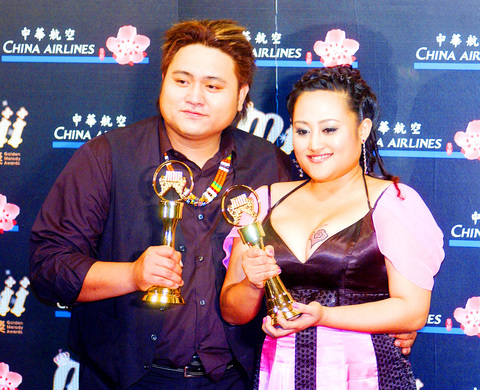In an evening dominated by alternative acts, Jay Chou (周杰倫) picked up his award for Best Single Producer, but it was independents who won big. Folk rock outfit Sodagreen won the coveted Best Band award, but even in the prestige categories such as Best Producer, independents dominated. And even in categories that are the exclusive realm of the big labels there were upsets, with South Korean Nicky Lee beating out six-time nominee David Tao for the best male Mandarin singer.
The 18th Golden Melody Awards, the music industry's night of backslapping and mutual congratulation, took place last night at the Taipei Arena (台北巨蛋). The annual event gives out awards to professionals making music in Mandarin, Taiwanese, Hakka and Taiwan's Aboriginal languages. This year, the nominees were drawn from record-breaking 8,103 entries by a 33-member panel of judges.
Despite afternoon showers thousands of teenagers and groupies laid siege to the stadium to ensure a good view, despite the absences of heavyweight pop idols such as Jay Chou and David Tao (陶?).

PHOTOS: AGENCIES
In this less than star-studded event, the two hosts, Momko Tao (陶子) and Patty Hou (侯佩岑) wearing NT$80 millions worth of jewelry, where the brightest stars on the red carpet dominated by alternative musicians and indie bands.
This year, the awards for artistic and traditional music were held earlier in the month, ensuring that the party last night went more smoothly with the absence of the non-pop crowd, who always looked so out of place among the glitterati.
Huang Chien-wei (黃建為), a college student whose folk debut Over the Way is inspired from the tranquil island life and rural landscapes, picked up the award for Best Newcomer early in the ceremony, setting the tone for what was to follow.

Lin Sheng-xiang (林生祥), considered by many as one of Taiwan's most original musicians, was awarded Best Hakka Singer and Best Hakka Album for Planting Trees (種樹). Lin used his acceptance speech to refuse the awards to signify his disapproval of the language-based categorizations used for the Golden Melody Awards. He announced that he would donate the prize money to four community groups working with Taiwan's agricultural communities, and expressed his support for the so called "rice bomber" Yang Ju-men (楊儒門). "It is music that gathers us here, not languages. So the event's subject should be the musical vocabulary rather than linguistic
differences," Yang said.
Always merging his music with sociopolitical messages, Lin has been a frequent GMA winner ever since the now disbanded Labor Exchange (交工樂隊) that was awarded major honors in 2000 and 2002. In 2005, Sheng Xiang and Water 3 (生祥與瓦窯3), Lin's music project with his long-term partner Zhong Yong-feng (鍾永豐) won Best Band, Best Hakka Album and Best Lyricist with Getting Dark (臨暗) that turns a sober gaze at globalization that sweeps the world.

In the Best Singing Group category, popular pub duo Hao-en (昊恩) and Puyuma songstress Jiajia (家家) took the trophy. The duo, breaking away from the stereotypes of Aboriginal music, have achieved considerable success on the pub circuit with their contemporary compositions fused with blues jazz, gospel and traditional folk music. (They are nominated for Best Mandarin Album, Best Singing Group, Best Producer and Best Composer). Folk rock outfit Soda Green picked up the highly coveted Best Band award. Having released four singles and two albums in two-years, Sodagreen had built up an audience base with campus tours and pub gigs and their self-titled debut album was nominated for the Best Composer and Best Band awards at last year's Golden Melody Awards. Formed by the six members during college, the folk rock band Sodagreen was a campus music luminary at the National Chengchi University (政治大學) and frequent winner for the school's annual music competition. Their career breakthrough quickly came in 2004 when the band took the jury award at Hohaiyan Rock Festival (海洋音樂祭) and discovered by musician and producer Lin Wei-tse (林暐哲).
In the Taiwanese music category, five-time nominee Shih Wen-bin (施文彬) picked up best male singer and taime (台妹) prototype Jeannie Hsieh (謝金燕) won best female.
One of last night's biggest surprises of last night came when last year's Best Band winner Chairman (董事長) beat off Judy Chiang (江蕙), the uncontested reigning queen of Taiwanese-language music and walked home with the Best Taiwanese-language Album. "We never thought we would win and our first reaction was like the title of the album "Jin Ei Ah Gey Ei" [meaning "you're kidding" in Taiwanese]," said the band backstage.

At the end of the evening, the prestige categories offered few surprises, as Jolin Tsai (蔡依林) finally won a long-overdue award for best female mandarin singer, and the evening finished on a slight note of confusion when MC Hotdog got the Best Album award, which may simply have been done to make sure that established artists did not completely disappear under the landslide of independent artists.
The Winners
Best Song 最佳年度歌曲獎
You are Marrying Me Today (今天妳要嫁給我)
Best Mandarin Album 最佳國語專輯獎
Wake Up
Best Producer 最佳專輯製作人獎
Chen Hui-ting (陳惠婷), Hsu Chih-yu (許哲毓), Lin Chien-yuan (林前源), Lin Hui-pin (林揮斌), Hsu Chih-pei (許哲珮)
Best Male Mandarin Singer 最佳國語男歌手獎
Nicky Lee (李玖哲)
Best Mandarin Female Singer 最佳國語女歌手獎
Jolin Tsai (蔡依林)
Best Taiwanese Female Singer 最佳台語女歌手獎
Jeannie Hsieh (謝金燕)
Best Aboriginal Singer 最佳原住民語歌手獎
I Chi (伊吉)
Best Taiwanese-language Album 最佳台語專輯獎
Jin Ei Ah Gey Ei!? (真的假的!?)
Best Hakka Album 最佳客語專輯獎
Planting Trees (種樹)
Best Aboriginal-language Album 最佳原住民語專輯獎
Folk Songs from the Heart (美麗心民謠)
Best MV Director 最佳音樂錄影帶導演獎
Stephen Fung (馮德倫)
Best Songwriter 最佳作曲人獎
Wu Ching-feng (吳青峰)
Best Lyricist 最佳作詞人獎
Zhong Yong-feng (鍾永豐)
Best Composer 最佳編曲人獎
Chen Chu-hui (陳主惠)
Best Single Producer 最佳單曲製作人獎
Jay Chou (周杰倫)
Best Taiwanese Male Singer 最佳台語男歌手獎
Shih Wen-bin (施文彬)
Best Hakka Singer 最佳客語歌手獎
Lin Sheng-xiang (林生祥)
Best Band 最佳樂團獎
Sodagreen (蘇打綠樂團)
Best Singing Group 最佳演唱組合獎
Hao-en and Jiajia (昊恩家家)
Best Newcomer 最佳新人獎
Huang Chien-wei (黃建為)
Best Instrumental Album 最佳專輯獎
Send You a Blue Gift for Winter (送你冬日藍)
Best Instrumental Album Producer 最佳專輯製作人獎
Chen Jien-nien (陳建年)

William Liu (劉家君) moved to Kaohsiung from Nantou to live with his boyfriend Reg Hong (洪嘉佑). “In Nantou, people do not support gay rights at all and never even talk about it. Living here made me optimistic and made me realize how much I can express myself,” Liu tells the Taipei Times. Hong and his friend Cony Hsieh (謝昀希) are both active in several LGBT groups and organizations in Kaohsiung. They were among the people behind the city’s 16th Pride event in November last year, which gathered over 35,000 people. Along with others, they clearly see Kaohsiung as the nexus of LGBT rights.

Jan. 26 to Feb. 1 Nearly 90 years after it was last recorded, the Basay language was taught in a classroom for the first time in September last year. Over the following three months, students learned its sounds along with the customs and folktales of the Ketagalan people, who once spoke it across northern Taiwan. Although each Ketagalan settlement had its own language, Basay functioned as a common trade language. By the late 19th century, it had largely fallen out of daily use as speakers shifted to Hoklo (commonly known as Taiwanese), surviving only in fragments remembered by the elderly. In

Dissident artist Ai Weiwei’s (艾未未) famous return to the People’s Republic of China (PRC) has been overshadowed by the astonishing news of the latest arrests of senior military figures for “corruption,” but it is an interesting piece of news in its own right, though more for what Ai does not understand than for what he does. Ai simply lacks the reflective understanding that the loneliness and isolation he imagines are “European” are simply the joys of life as an expat. That goes both ways: “I love Taiwan!” say many still wet-behind-the-ears expats here, not realizing what they love is being an

In the American west, “it is said, water flows upwards towards money,” wrote Marc Reisner in one of the most compelling books on public policy ever written, Cadillac Desert. As Americans failed to overcome the West’s water scarcity with hard work and private capital, the Federal government came to the rescue. As Reisner describes: “the American West quietly became the first and most durable example of the modern welfare state.” In Taiwan, the money toward which water flows upwards is the high tech industry, particularly the chip powerhouse Taiwan Semiconductor Manufacturing Co (TSMC, 台積電). Typically articles on TSMC’s water demand